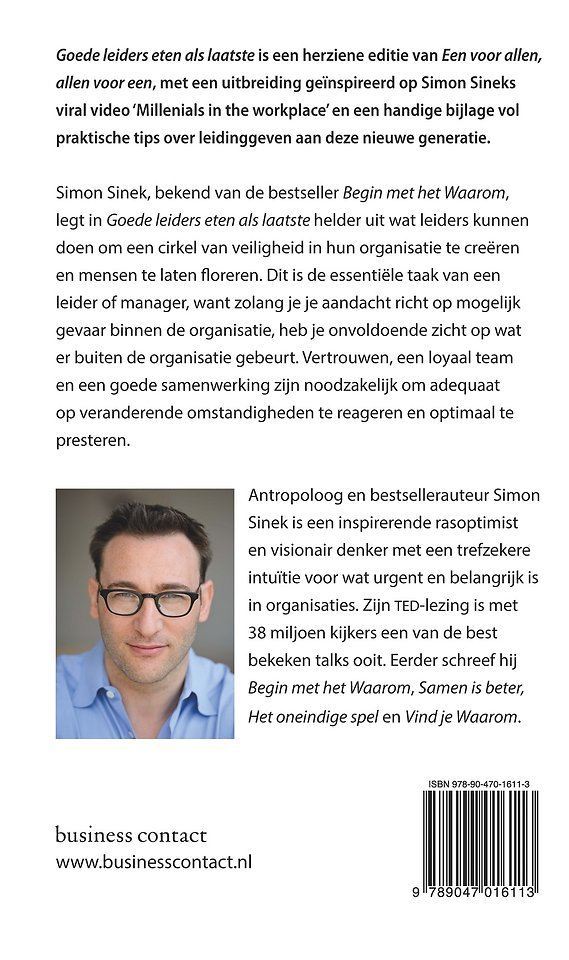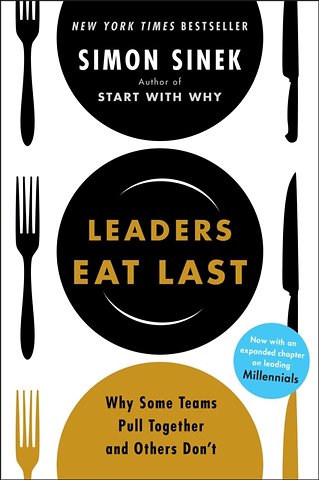



Simon Sinek wordt omschreven als 'visionary thinker with rare intellect'. Hij is een onverwoestbaar optimist die gelooft in een stralende toekomst en in onze kracht om die samen op te bouwen. Sinek is auteur van meerdere bestsellers, waaronder de wereldwijde hit 'Start with Why' en 'Leaders Eat Last'. Hij host de podcast A Bit of Optimism en is oprichter van The Optimism Company.
Meer over Simon SinekLeaders Eat Last
Why Some Teams Pull Together and Others Don't
Gebonden Engels 2014 1e druk 9781591845324Samenvatting
Imagine a world where almost everyone wakes up inspired to go to work, feels trusted and valued during the day, then returns home feeling fulfilled. This is not a crazy, idealized notion. As Simon Sinek noticed in his travels around the world, great leaders create environments in which people naturally work together to do remarkable things. Some of these teams trust each other so deeply that they would literally put their lives on the line for each other.
Far more common, unfortunately, are teams that seem doomed to infighting, fragmentation, and failure, no matter what incentives are offered. But why?
The answer became clear during a conversation with a Marine Corps general who explained a USMC tradition: “Officers eat last.” Sinek watched as the most junior Marines ate first while the most senior Marines took their place at the back of the line.
What’s symbolic in the chow hall is deadly serious on the battlefield: great leaders sacrifice their own comfort—even their own survival—for the good of those in their care.
This principle has been true since the earliest tribes of hunters and gatherers. It’s not a management theory; it’s biology. Our brains and bodies evolved to help us find food, shelter, mates, and especially safety. We’ve always lived in a dangerous world, facing predators and enemies at every turn. We thrived only when we felt safe among our group.
Our biology hasn’t changed in fifty thousand years, but our environment certainly has. Today’s workplaces tend to be full of cynicism, paranoia, and self-interest. But the best organizations foster trust and cooperation because their leaders build what Sinek calls a Circle of Safety that separates the security inside the team from the challenges outside.
The Circle of Safety leads to stable, adaptive, confident teams, where everyone feels they belong and all energies are devoted to facing the common enemy and seizing big opportunities. Leaders who are willing to eat last are rewarded with deeply loyal colleagues who will stop at nothing to advance their leader’s vision and their organization’s interests. It’s amazing how well it works.
As he did in Start with Why, Sinek illustrates his ideas with fascinating true stories from a wide range of fields.
Trefwoorden
Specificaties
Lezersrecensies
Inhoudsopgave
Deel 1: Onze behoefte aan veiligheid
1. Bescherming van bovenaf 13
2. Medewerkers zijn ook mensen 20
3. Erbij horen 33
4. Ja, maar... 41
Deel 2: Imposante krachten
5. Toen genoeg nog genoeg was 50
6. e.d.s.o. 57
7. De c van... 76
8. Waarom we leiders hebben 88
Deel 3: De werkelijkheid
9. De moed om te doen wat juist is 101
10. Een sneeuwscooter in de woestijn 106
Deel 4: Hoe we hier beland zijn
11. De hoogtijdagen voordat de zeepbel barstte 113
12. De boomers als grote mensen 124
Deel 6: Verwoestende overdaad
17. Leiderschapsles 1: Zo de cultuur vaart, vaart het bedrijf 171
18. Leiderschapsles 2: Zo de leider vaart, vaart de cultuur 184
19. Leiderschapsles 3: Integriteit telt 198
20. Leiderschapsles 4: Vrienden zijn belangrijk 211
21. Leiderschapsles 5: Leid de mensen, niet de getallen 222
Deel 7: Een maatschappij van verslaafden
22. We zijn de kern van onze eigen problemen 241
23. Tegen elke prijs 249
24. De abstracte generatie (Herzien en uitgebreid) 258
Deel 8: Een leider worden
25. De twaalfde stap 288
26. Gedeelde strijd 293
27. We hebben meer leiders nodig 302
Bijlage: Een praktische gids voor leidinggeven aan millennials 305
Dankwoord 322
Noten 326
Literatuur 346
Register 348
Anderen die dit boek kochten, kochten ook
Rubrieken
- advisering
- algemeen management
- coaching en trainen
- communicatie en media
- economie
- financieel management
- inkoop en logistiek
- internet en social media
- it-management / ict
- juridisch
- leiderschap
- marketing
- mens en maatschappij
- non-profit
- ondernemen
- organisatiekunde
- personal finance
- personeelsmanagement
- persoonlijke effectiviteit
- projectmanagement
- psychologie
- reclame en verkoop
- strategisch management
- verandermanagement
- werk en loopbaan





